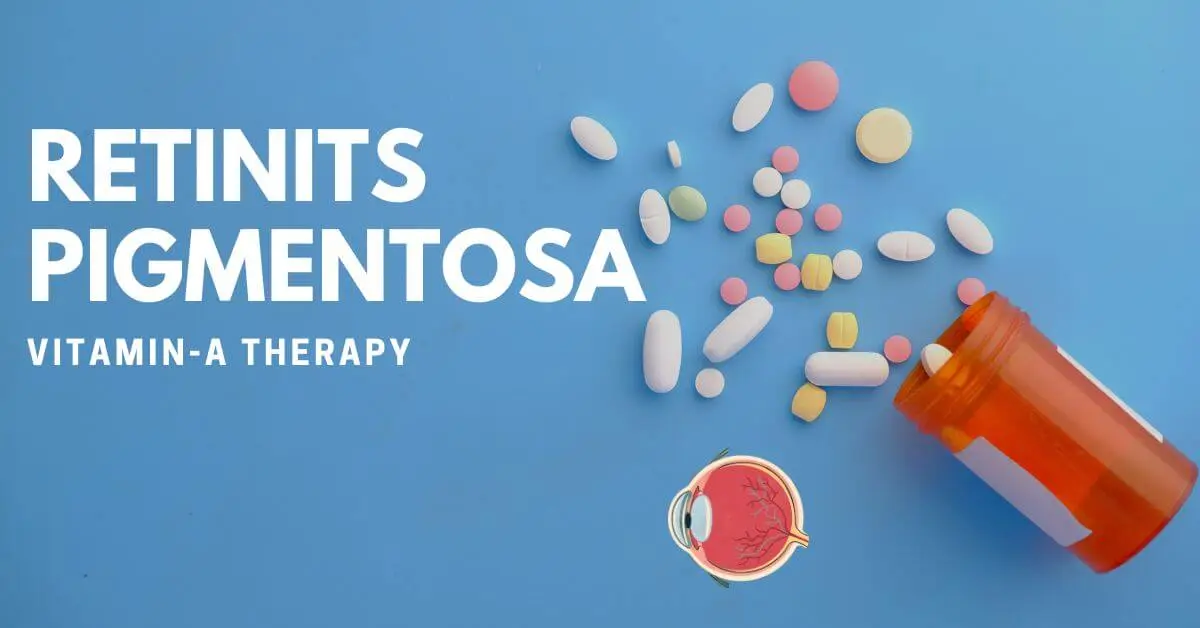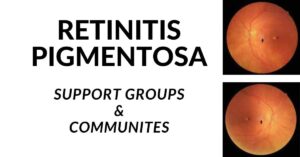Retinitis pigmentosa, a complex and rare genetic eye disorder, casts a shadow of uncertainty over the lives of those affected. This condition slowly erodes the precious gift of sight, leading to night blindness, tunnel vision, and, in severe cases, complete blindness.
While its primary cause lies in genetic mutations, researchers and eye specialists have been uncovering the potential role of a well-known nutrient – Vitamin A – in the management and progression of retinitis pigmentosa.
In this article, we will explore the current state of research and scientific understanding of the relationship between retinitis pigmentosa and Vitamin A. We will examine the efficacy of Vitamin A therapy, the recommended dosage, and the potential risks involved.
So, let us journey into the fascinating world of retinitis pigmentosa and Vitamin A, where science meets hope, and where a simple nutrient might just hold the key to a brighter future for those living with this challenging eye condition.
Table of Contents
ToggleRetinitis Pigmentosa and Vitamin A
As researchers have dived deeper into the mysteries of retinitis pigmentosa, they’ve begun to unravel the potential connection between Vitamin A and the health of the retina.
Vitamin A, known for its crucial role in maintaining vision, has been a star player in eye health for decades. It is essential for the functioning of photoreceptors, particularly the rods, which provide us with the ability to see in low-light conditions, such as during nighttime.
This relationship between Vitamin A and the rods’ function has brought it into the spotlight as a possible avenue for supporting individuals with retinitis pigmentosa.
It is crucial to remember that while Vitamin A may offer some benefits for certain types of retinitis pigmentosa, it is not a universal cure, and it should be used as prescribed by eye physicians.
Can Retinitis Pigmentosa be Caused Due to Vitamin Deficiency?
Retinitis pigmentosa is a rare, genetic eye disorder that affects the retina, the light-sensitive tissue at the back of our eyes. It leads to gradual vision loss, night blindness, and, in severe cases, complete blindness.
While the primary cause of retinitis pigmentosa is genetic mutations, research has shown that vitamin A deficiency can also play a significant role in the progression of this condition.
How Does Vitamin A Help the Retina?
Vitamin A plays the main character when it comes to ocular health. It plays a vital role in maintaining the health of the retina and its light-sensitive cells, known as photoreceptors. These photoreceptors receive light signals, process them and transfer them to the brain in the form of electrical stimulus. The brain then displays these signals as images.
One specific type of photoreceptor, called rods, helps us see in low-light conditions, like during nighttime. Vitamin A is essential for the functioning of these rods, allowing us to have clear night vision. So, if your diet lacks sufficient vitamin A, it can lead to decreased night vision, a common symptom of retinitis pigmentosa.
Retinitis Pigmentosa Vitamin A Therapy
Since vitamin A plays such a crucial role in the health of the retina, researchers and medical professionals have explored vitamin A therapy as a potential treatment for RP. The therapy typically involves administering high doses of vitamin A to patients with this condition.
However, it’s important to note that not everyone with retinitis pigmentosa will benefit from vitamin A therapy. This treatment is more effective for specific genetic mutations that respond well to the supplement. Therefore, it’s essential to consult an ophthalmologist or a retinal specialist to determine if vitamin A therapy is suitable for individual cases.
Can Retinitis Pigmentosa be treated with Vitamin A?
While vitamin A therapy shows promise for some individuals with retinitis pigmentosa, it’s essential to manage expectations. Vitamin A treatment is not a cure for this condition, but it can potentially slow down its progression and improve certain aspects of vision.
In some cases, vitamin A therapy has been found to slow the degeneration of the photoreceptor cells, helping individuals maintain their remaining vision for a more extended period.
This can significantly improve their quality of life and ability to navigate their surroundings.
Is Vitamin A Good for Retinitis Pigmentosa?
Yes, vitamin A can be beneficial for individuals with RP, particularly those whose condition is influenced by specific genetic mutations.
It’s important to understand that vitamin A supplements alone won’t completely reverse the effects of retinitis pigmentosa, but they may slow down its progression and offer some degree of support to the retina.
How Does Vitamin A Deficiency Cause Retinitis Pigmentosa in Children?
In some cases, vitamin A deficiency can lead to a variant of RP known as “retinitis punctata albescens.” This rare form of the condition often presents in childhood and is characterized by white spots or flecks in the retina.
Vitamin A deficiency can impair the functioning of photoreceptor cells, particularly the rods, leading to visual disturbances and the appearance of these white spots. Therefore, ensuring an adequate intake of vitamin A during childhood is crucial for maintaining healthy retinal function.
How Much Vitamin A for Retinitis Pigmentosa?
The dosage of vitamin A required for retinitis pigmentosa treatment can vary based on individual factors and genetic mutations. Typically, eye physicians recommend a daily dosage ranging from 15,000 to 25,000 international units (IU) of vitamin A.
It’s important to stress that vitamin A supplements should only be taken under the supervision of a qualified healthcare professional to avoid potential side effects and toxicity.
Retinitis Pigmentosa Vitamin A Drops
For individuals who may have difficulty swallowing pills or prefer alternative forms of supplementation, vitamin A drops can be an option. These drops can be placed directly on the tongue or mixed with a beverage, making it easier for some individuals to adhere to their prescribed vitamin A regimen.
However, as with any form of supplementation, it’s crucial to follow the recommended dosage and consult with a healthcare professional.
Is Daily Intake of Vitamin A Safe in RP?
For individuals with RP undergoing vitamin A therapy, taking the recommended dosage every day is essential to potentially slow the progression of the condition. However, as mentioned earlier, vitamin A supplementation should be done under the guidance of a healthcare professional to ensure safety and efficacy.
What are the Best Eye Vitamins for RP?
When it comes to eye health, vitamins, and nutrients are crucial in maintaining proper function and preventing degenerative diseases like RP. Among various vitamins, Vitamin A stands out as a key player in supporting retinal health.
Is Vitamin A Safe for RP-Affected Eyes?
While vitamin A can be helpful for individuals with RP, it’s crucial to follow the recommended dosage guidelines and seek professional advice. High doses of vitamin A can be toxic and lead to adverse effects on overall health and vision. Therefore, self-medication or overconsumption of vitamin A supplements should be strictly avoided.
Conclusion
In conclusion, the relationship between retinitis pigmentosa and Vitamin A opens a new chapter in our understanding of this intricate eye disorder. While genetic mutations remain the primary cause, the potential role of Vitamin A as a therapeutic agent offers hope for those affected.
However, it is essential to approach Vitamin A therapy with caution and under the guidance of healthcare professionals. The dosages must be carefully calibrated to avoid the risk of toxicity, which can lead to adverse effects on overall health and vision.





